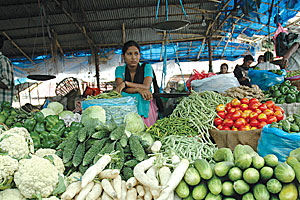 KIRAN PANDAY |
Nepal Rastra Bank (NRB) reiterated recently that the sustained high price of goods and services was largely due to "non-monetary" factors. It conceded that taming it through the money supply mechanism was not within its remit.
The official rate of inflation is holding unchanged at 14.5 per cent for the past four months. However, breaking it down into the price of 20 everyday goods and services, inflation is 60 per cent up on the same month last year.
Our price situation generally follows trends in India, particularly the Bihar-UP scenario owing to currency pegging and the open border. This time, it is different: India's inflation is hovering at 4 per cent while the Indian authorities fear deflation and the ultimate contraction of the economy. Commodity prices the world over have reduced largely due to low fuel and transportation costs and, plummeting demand due to the global crisis.
The absence of supply side constraints of commodities should not contribute to inflation. India, the world price situation and the demand-supply situation within Nepal fail to justify the current inflationary trend in Nepal.
Instead, the current price hike is caused by a combination of carteling by transport operators and importers, organised price manipulation by hoarders and wholesalers, artificial shortage by black-marketers and over-invoicing by retailers. Continuous shutdowns, blockades, mainly along the East-West highway, all contribute to the price escalation. More significantly, such highway blockages provide the excuse to unscrupulous market manipulators to gouge prices.
Even in the most liberal economy, the state plays the role of referee. Here, the Rastra Bank says the causes of present price hike is beyond its purview and other regulatory and enforcement mechanisms are absent, exposing the systemic dysfunction of the state. The market anarchy has severely affected implementation of policies like VAT.
Recalcitrant traders are now deliberately evading issuing VAT invoices because of the volatile price situation.
The government, instead of correcting the market malfunction, has started sell-on-wheels of limited consumer items like rice. This is not a solution to the problem. People do not trust the accessibility and timely availability of such government services, and it is not the job of the government to carry out a supply operation of this sort.
In fact, door-to-door sales is a face-saving gesture and the government's admission that it is unable to correct market maladies. Such political gimmicks do not correct the supply and price anomaly, on the contrary they help drive prices further up.
The non-monetary factors affecting the price hike point to a failure of the law and order situation, lack of coordination among the government agencies and inadequate legal framework and enforcement mechanism, or both. One only needs to look at Zimbabwe to see what can happen.
Nepal is seeing the effect of profiteers at the cost of social stability and consumer rights. This is perhaps the only country in the world where taxi drivers organise strikes demanding the right to tamper the fare meter, petroleum dealers stop supplies in protest of adulteration tests and banks form cartels to prevent competitive trade that helps reduce the cost of goods and services.
Some orthodox economists argue that the government's inability to introduce capital expenditure of some Rs 25 billion has somehow helped to contain the inflation going out of hand. In effect, had the government been able to spend its development allocation as proposed in the finance bill, economic activities would have got a boost. This would have reactivated the competitive trend and contributed positively to price control.
Our government needs to get the domestic economy back on track, regulate the market rather than divert resources on what it can't and shouldn't do, like selling commodities door-to-door in a vain attempt to stabilise prices.



